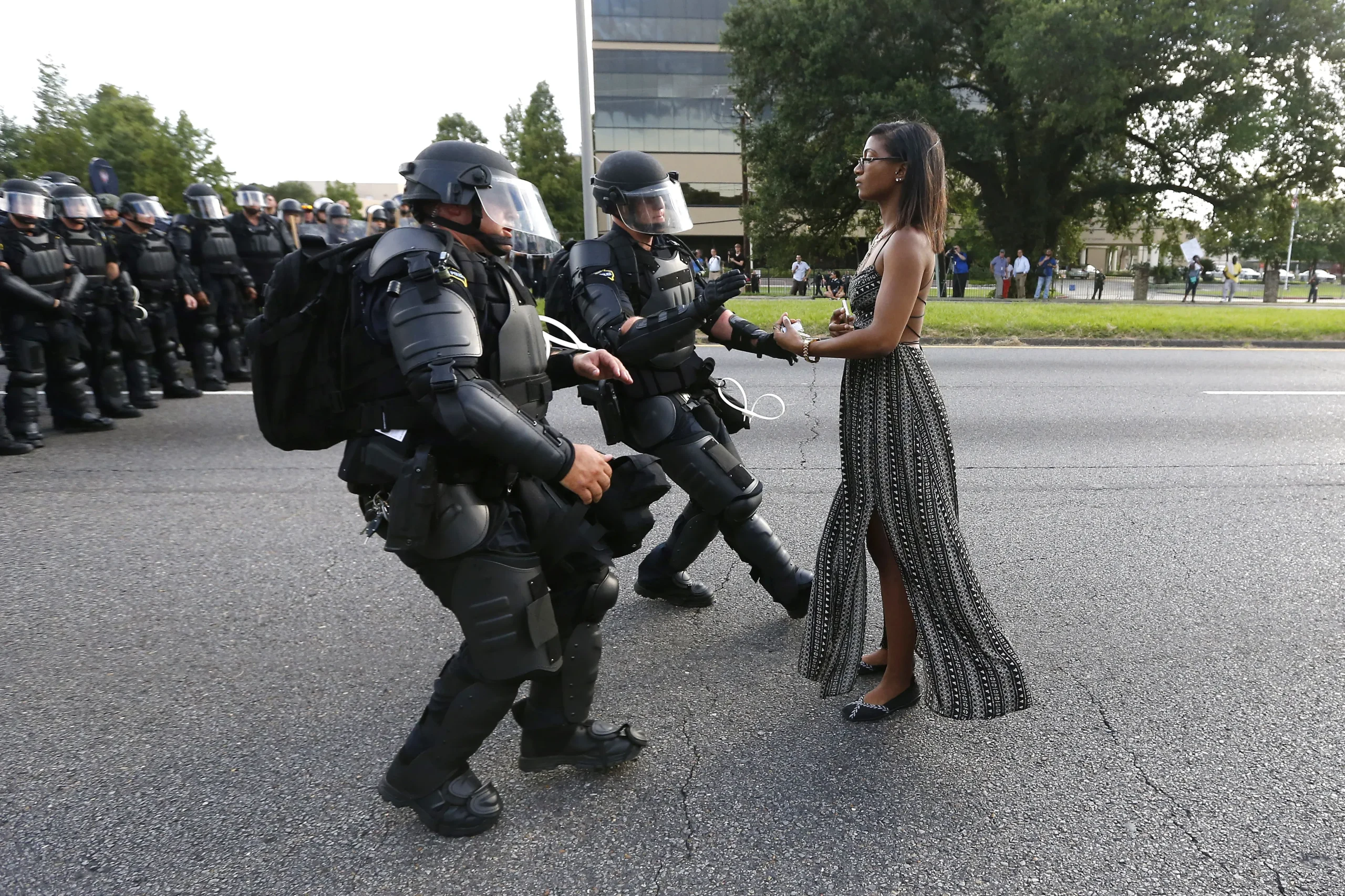Dear friends,
Happy Mother’s Day! I’m delighted to share my latest essay on gentleness published by Cultivare. It was appropriately paired by Jonathan Bachman’s iconic photograph of Ieshia Evans, a mother and nurse, who defiantly faced riot police with gentleness at a Black Lives Matter protest in Baton Rouge, Louisiana on July 9, 2016.
I hope this meditation encourages you!
Andrew
Gentleness: Pure Power
“The soul is highest, noblest, and worthiest when it is lowest, humblest, and gentlest.”
Julian of Norwich
For just a moment, imagine that you have access to great power. In fact, go all the way and imagine that you enjoy godlike power – the power that created the universe and can outlive death. What might spring out of you and into your relationships and world?
Gentleness is the Apostle Paul’s surprising answer. When the empowering presence of God suffuses our lives, gentleness springs out of us and spreads between us (Galatians 5:23).
This was delightfully divergent theologizing. Gentleness wasn’t valued in the Roman Empire. Paul’s original audience lived in Galatia, an imperial city that worshiped the war god Sabazios. As I mentioned in a previous essay, Sabazios was pictured on horseback trampling his enemies; domination was his proof of power. Even in Paul’s Hebrew scriptures, God’s presence was often imagined as overwhelming and terrifying.
But Paul’s encounter with the executed-yet-alive Jesus profoundly altered his vision of God. He went on to write that gentleness is the fruit of God’s Spirit. It’s a sure sign that God is present and at work in us.
Importantly, Paul isn’t referring to the passivity of a pushover or naive niceness. Gentleness is love’s nonviolent power nurturing compassionate presence within us and between us, even amidst distress. The gentle can respond to trouble with tenderness because they are tethered to love. They resist becoming hardened and harsh; they remain grounded in behaving like we’re actually beloved and worthy of care. Brother Lawrence, a 17th century war survivor and French mystic, said that practitioners of God’s presence become “infinitely far from all harming.”
Gentleness (prautés) appears sixteen times in the New Testament. Strikingly, the word is always used in contexts of stress. It’s paired with volatile emotions like grief, fear, envy, and rage. Gentleness is presented as the Spirit-empowered way of engaging polarized identities, answering insults, facing threats, and suffering injustice (Colossians 3; 1 Peter 3). Paul contrasts the use of weapons and waging war with “the gentleness of Christ” (2 Corinthians 10:3-4). With playful irony, he writes that gentleness is how we “fight the good fight of the faith” in defiance to violent rulers like Pontius Pilate (1 Timothy 6:12). Lest we privatize this God-embodying virtue, Paul addresses politics and urges, “always be gentle toward everyone” (Titus 3:2). This was delightfully divergent theologizing indeed. It still is.
Across the ages, loving parents stand out as exemplars of this nonviolent power that God wants to cultivate in all of us. Mothers possess the particularly fierce strength to carry and nourish another life within their own body for most of a year. They do so amidst exhaustion, nausea, and unrelenting responsibility. Then they deliver this life into the world through excruciating pain. As this grueling miracle unfolds, a healthy baby often cries out with piercing distress and becomes a flailing incarnation of total dependence. No mammal is born with as much vulnerability as we are – powerless to move, feed, clean, or protect ourselves. In the wake of this holy ordeal, many parents understandably experience depression, rage, and other complex emotions. To a newborn baby, a parent’s power is godlike and could be crushing.
And still, loving parents choose to hold their babies close to their bodies. They struggle to soothe and sustain them through waves of distress. They strive to create the safety in which their child’s ever-evolving humanity can unfold with care. Few scenes capture gentleness like a parent transferring their newborn into trusted arms. All throughout a child’s formation, loving tenderness attends to nerve-wracking challenges and sometimes heartbreaking tragedies. In the end, parents’ labor looks to another bittersweet handoff: releasing an independent human into a harsh world who, hopefully, grounds their own fierce power in nonviolent love with and for others.
My 85-year-old friend Tom McDowell recently told me about how he survived the atrocious evils of American racism and learned to practice gentleness even under extreme pressure. As a child in Mississippi, Tom witnessed his grandfather, Rev. Isaac Simmons, get lynched by six white men. They wanted his land and were willing to kill for it. Then Tom saw his father get tied to a tree and beaten bloody. Years later, he himself got jailed with Ralph Abernathy, Dr. King’s mentor. They weren’t attacking or abusing anyone; they were in Washington, D.C. peacefully marching for civil rights. How did Tom survive these brutal injustices and persist in his nonviolent power? Tom told me, “My mother kept us and guarded us and prayed for us. My parents never taught us prejudice and always taught us forgiveness.”
It’s hard to imagine a purer power, this gritty gentleness instilled by loving parents to overcome evil and participate in transforming it for good. Paul alerts us that this is the organic evidence of God’s presence alive in us, not the arrogance and aggression so entrenched in culture. Without gentleness, there is no God.
Perhaps it was Mary’s mothering that inspired Jesus to speak this prophetic wisdom at the beginning of his divergent movement and then to trust it even unto death: “Blessed are the gentle, because they will inherit the earth.”
Gentleness is our divine birthright and everlasting vocation.
***
To delve deeper into gentleness, visit Cultivare, Issue 57 | May 2025 where this essay was originally published. I’m grateful to Dr. Duane Grobman, editor of Cultivare, for permission to publish my essay here.
Photo Credit: Jonathan Bachman (Reuters), “Taking a Stand in Baton Rouge,” July 9, 2016.





